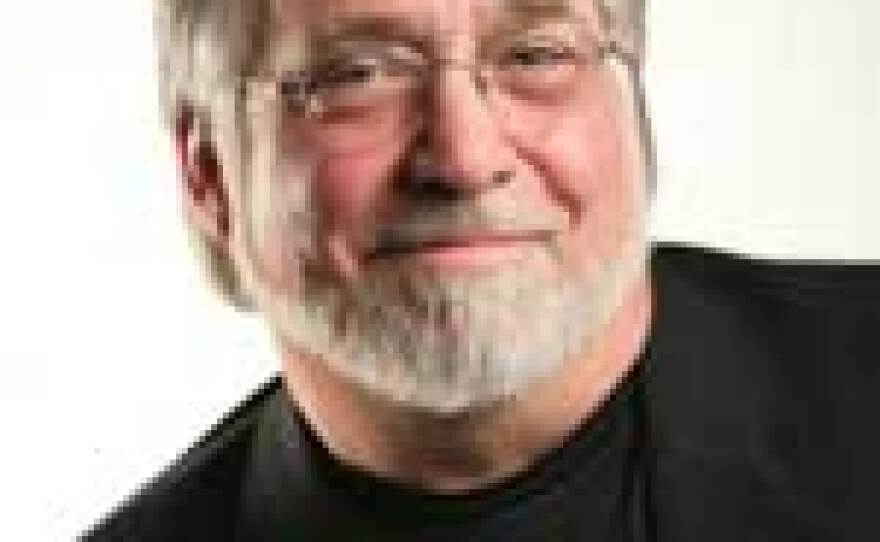ALISON ST. JOHN: You're listening to KPBS Midday Edition, I am Alison St. John. For fifty-nine years the La Jolla Symphony and Chorus pursued its mission to inspire San Diego with the joy of music. It's San Diego's oldest and largest orchestra and chorus and choral director David Chase is the oldest conductor in San Diego. He is celebrating his fortieth season this year with a special series of concerts celebrating life. Thank you for joining us. Tell us a little bit over the forty years, how has La Jolla Symphony Chorus changed? DAVID CHASE: When I first started, it was a rather ragtag organization and I think it was probably a ragtag young man as far as that goes. We both grew up together. Over the years it has turned into a real instrument. ALISON ST. JOHN: Far from it, there's over 100 singers in it, and all volunteers. DAVID CHASE: That is right. And the quality of the singers keep going up and the challenge of the music keeps getting higher. ALISON ST. JOHN: Back in 1973 at your stories that you and your wife packed up your belongings and came to San Diego for this job. Is that a risk for you? DAVID CHASE: It was. We were young and foolish and it does for that. ALISON ST. JOHN: That job at that time, how did that appeal? DAVID CHASE: It was just a graduate assistant show, so I just came here and assisted to begin with and that it developed from there. ALISON ST. JOHN: Has certainly turned into something quite wonderful, I noticed that the auditions for the Symphony chorus a little bit of unusual, you're looking for people to seek a familiar song in an unfamiliar way, what are you looking for your singers? DAVID CHASE: At risk somewhat famous in a way, but we do is actually have people saying something that they do now, and give them a version of it that has a lot of small changes and mostly articulations and dynamic changes that you simply have to be of the sea on the page, and responds quickly to. The reason that we do that is that is the way that we talk about music and rehearsals. It's adding an accent to this or adding arrested there, and that clarifies the music and the fastest way I know, I want to know the people can do that with a command. ALISON ST. JOHN: Okay people with a more creative approach to it of interpreting pieces. This season, you have a series of concerts celebrating life and the sentence that is based on is really interesting. Shelley read it here or to know by heart? DAVID CHASE: I do not know it by heart I did not write it - ALISON ST. JOHN: It is written by a famous music director. It's called life is fresh and sometimes scary had been plain sight and life is for celebrating. This weekend it's utterly ecstatic as the theme, had you think the composition is chosen for this and we can fulfill that promise? DAVID CHASE: I think most people here this concert will experience it as a tremendously colorful full of fancy pieces, these pieces are actually all rather large and very creative the idea of ecstasy I suppose is was easily associated with the the simply must centralist voluptuous piece of music that you'll ever hear. ALISON ST. JOHN: We have a clip of that. Let's hear it. DAVID CHASE: The chorus is part of the orchestra in this piece, that is one of the interesting things about it, then being upfront so to speak in the sound. ALISON ST. JOHN: Okay this is a little part of Daphnis et Chloe. [[AUDIO FILE PLAYING]] ALISON ST. JOHN: That was Daphnis et Chloe and David Chase the choral director is sitting here breathing deeply. That is what this music does. DAVID CHASE: It does, and I suddenly realized I was really relaxing at last. ALISON ST. JOHN: That is to represent the act is ecstasy. The other really expected ecstatic moment is applied. Some people use using for a specific thing, people who are older wealthier, what you do when your choosing music that the Symphony performs to make it more accessible to a broader broader odd audience? DAVID CHASE: With the La Jolla Symphony and we have taken a different route, yet have in a sense held to original principles which essentially said that there is a gigantic body of repertoire that is fabulous music from several centuries back, we have to serve it, but we have to serve equally music of more recent times and music of different kinds of philosophies and genres. We have some that is more modern if you will, and we found as other organizations across the country have more recently found, it really does bring it or people. Rather than scare them away. ALISON ST. JOHN: This is like a community Symphony chorus? How important is this to you? DAVID CHASE: To me personally, it's everything. It's a phenomenal experience and it's family and we really enjoyed that aspect of it and that is what brings these concert together. ALISON ST. JOHN: Hattie thank you for this course into this wonderful seven we just heard? DAVID CHASE: About hundred twenty singers. Over the years, it has been clear to me that I work for them. That makes a difference. I work for them and we together work for the music. That is pretty simple but that is the only answer I can give you. ALISON ST. JOHN: Let's hear another bit for this weekend's upcoming performance which is called Baker is the resort. Tell us a bit about the composer. DAVID CHASE: This is from Paul Henry at UCSD, composer commissioned by our ongoing program. The Thomas Nee Commission. The commission a new piece every season, usually a fairly small or short piece, this is not small at any way. Actually he was given the orchestration from the rebel, which is a huge orchestra and that is in a candy store for young composer, he put together a very interesting text from four different sources, in a way that is absolutely unique and this piece is just full of interesting changes throughout. ALISON ST. JOHN: Okay, let's hear a little bit of Ikarus-Azur. [[AUDIO FILE PLAYING]] ALISON ST. JOHN: Okay, that beautiful ethereal sound is called Ikarus-Azur, and that as part of the performance coming up this Saturday celebrating a series of concerts celebrating to chase his fortieth season with the La Jolla Symphony. How much rehearsal do you do? DAVID CHASE: The chorus starts earlier than the orchestra, we take a little longer to put together this kind of music, and that awful lot of people worked very hard and we have three hours at a time on Monday nights, and we have been working at this for seven or eight weeks and then we combined with the orchestra for four weeks, and that we put it together. ALISON ST. JOHN: So there is a lot of folk lot of work in, you have to be very dedicated. DAVID CHASE: People worked very hard. But they were all happy. ALISON ST. JOHN: To take risks with your choosing the pieces for this? DAVID CHASE: Oh yes. ALISON ST. JOHN: Give us some examples. DAVID CHASE: I think that that is kind of a point here that when you asked me earlier probably what got to where we are now, I think part of that is actually the fact that we have a certain control that we gained as artistic directors have a certain control over what will determine to and the approach to that is to always reach an I would say that this is an example of that. ALISON ST. JOHN: You've taken the chorus all over the world, even to Bhutan. What did you do to convince them that you are the first that you should be the first Western course to come to perform in that country that is dedicated that happiness? DAVID CHASE: We learned a lot about that while we were there. Thank you about as a result of the two people who have organized all of those tours for us over the many years, and they had been friends of the Kings musician in Bhutan and they suggested this idea that a Western ensemble should do a tour through these mountains and the Kings musician told me that he started out with a vision that he would bring the New York harmonic and tells me this is we're running around in the small buses that barely make rather quarters, and he said that eventually came down to chorus and it is here. We're not we were not they New York harmonic that we were the first Western ensemble to play a classical ensemble in Bhutan. ALISON ST. JOHN: In this last fifty years how would you say your artistic approach to music of them all? DAVID CHASE: That is a big question. If you're talking about this and this entire period, have to say that it has gone from being nothing but a wish and a prayer to a lot of experience and all of which is ultimately focused on composition. I come from a different anger to a goal that a lot of people and it is not as much of vocal experience, but a it really has to do with the music itself. ALISON ST. JOHN: Let's go out on a piece of music that you may have chosen, which is one of your favorites which will be part of the season. Tell us why you like this so much. DAVID CHASE: This is a piece that we have done once before and it and wanted to do it again, and it's a favor to me that we had the season with it and it is a setting of, we read poetry in status that is before the fun and funny and it's a very colorful setting with a Latin American feel throughout, a great use of the chorus and orchestra. ALISON ST. JOHN: We will go out on the music and I want to thank you so much for joining us. [[AUDIO FILE PLAYING]]
For 59 years, the La Jolla Symphony & Chorus has pursued its mission: to inspire San Diego with the joy of music.
It is San Diego’s oldest and largest orchestra and chorus.
This year, the Symphony & Chorus celebrates life and all its complexities. This concert season is dedicated to one life in particular: choral director David Chase, who's celebrating 40 years with the Symphony & Chorus.
The upcoming Dec. 7 and 8 concerts are themed "utterly ecstatic" and feature Aaron Jay Kernis' "Musica Celestis" and Maurice Ravel's "Daphnis et Chloe."
The concerts will also feature the world premiere performance of "Ikarus-Azur," a composition by UC San Diego graduate student Paul Hembree. Hembree is also a recipient of the Thomas Nee Commission.







